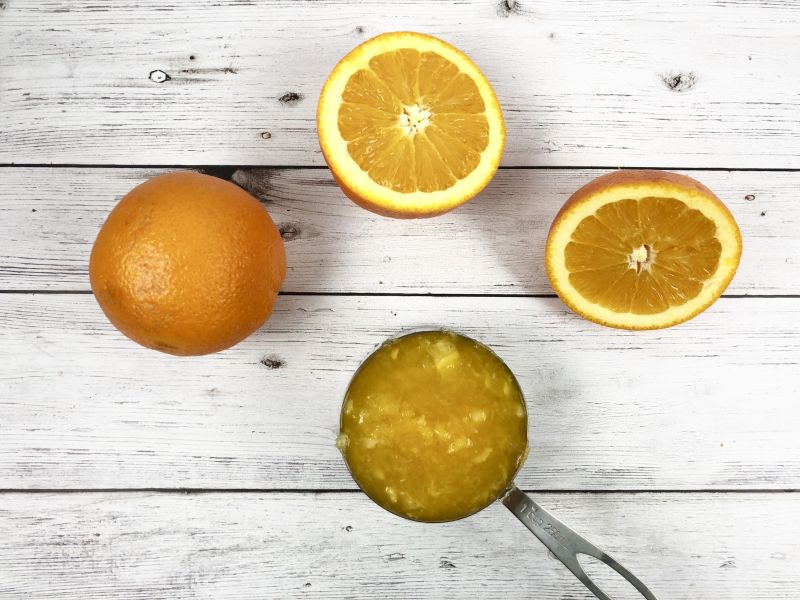You can see 2.4 dl (1 cup) orange juice on the above picture. It's with fibre. I threw only the peel away. I used 2 big oranges for this amount of juice. If I have removed the fibre too, I might have needed 2.5-3 oranges too, to make the same amount.
When we drink fruit juices, we don't realize that we eat. Could we easily eat 2-3 oranges in one go? And could our kids do the same, who we also give the juices to?
It takes seconds to drink 2.4 dl/ 1 cup of a fruit juice. We don't even have to chew it. And in many cases, we don't even stop at a 1 cup portion... but we can easily drink 2-3 glasses of it.
Since we don't chew it, we think we just drank something. But at the same time we consume lots of sugar and liquid calories.
A part a this sugar is fructose. This fructose start up different chemical processes in our liver. The end result of these processed are fat dropletts, that are deposited on the liver. This is called non-alcoholic fatty liver. It's true, that it's not due to alcohol consumption, but the result is the same. This can be present in kids too, not just in adults. More and more kids suffer from this problem.
The body can't produce glycogen (that can be used for making energy later on) from fructose. The body converts fructose into fat.
The problem doesn't stop at fatty liver. It can cause issues on other areas too, that can trigger different illnesses, such as cardiovascular disease or diabetes:
- increase triglyceride level
- increased LDL cholesterol level (the so called bad cholesterol)
- increased blood pressure
- fat deposit layer around other organs
- makes cells insulin resistant, and that can lead to diabetes
- increases the level of free radicals, that can lead to cell and DNA damage.
How much is too much depends on the given person. Some people can consume a lot without any consequences, while other people start to have issues at a much lower amount.
This doesn't mean that nobody should ever again consume fruits! This simply means, that
- it's better if we don't consume too much fruit juices, mainly on a regular basis,
- it's better not to eat too much fruits,
- it's better if you avoid highly processed, sweetened juices, drinks and foods and be aware of the issues of high fructose corn syrup, refined sugars and sweeteners.
Obviously every fruit has a different sugar and fructose content. Some has lower, some has higher levels. Generally speaking dried fruits have higher levels, since the sugar content gets concentrated in them. So it's better to keep your portions low on these too.
I place here 2 nutrient chart. Unfortunately it doesn't say how much fructose is there in them, but I can see those numbers on my bigger chart, so I add that information too.
2.4 dl / 1 cup orange juice has more than 34g sugar, and 7.5g is fructose out of that sugar content. We can easily drink this 173 kcal in a couple of seconds, while we didn't realize, that we were drinking liquid calories. At least we consume 8.6g fibre as well, and that help a bit to slow down the absorbtion of that 34g sugar.
I didn't make the fibre free orange juice, so I just guess, that since there's no fibre in it to fill out the space, I'd need 2.5 oranges to make 1 cup of fibre free juice. In that case there's 43g sugar, of which 9g is fructose. In this case we drink 216 kcal in seconds, with no fibre to slow down the sugar absorbtion.
1 orange, that we eat nicely and slowly, so we realize that we eat something, there is 86 kcal, 17.2g sugar, of which 3.7g is fructose and there's 4.2g fibre too.
This applies to all other fruit juices too, however the numbers can very somewhat.
If you make a nice, colourful salad out of it, like this orange-pecan salad, you'll feel full longer and you'll consume plenty of useful nutrients through the veggies.
https://www.health.harvard.edu/heart-health/abundance-of-fructose-not-good-for-the-liver-heart
https://www.ncbi.nlm.nih.gov/pmc/articles/PMC4926480/
https://www.ncbi.nlm.nih.gov/pmc/articles/PMC2836438/
https://www.ncbi.nlm.nih.gov/pmc/articles/PMC3953806/
http://sugarscience.ucsf.edu/the-toxic-truth/#.WniAVGaZORs







